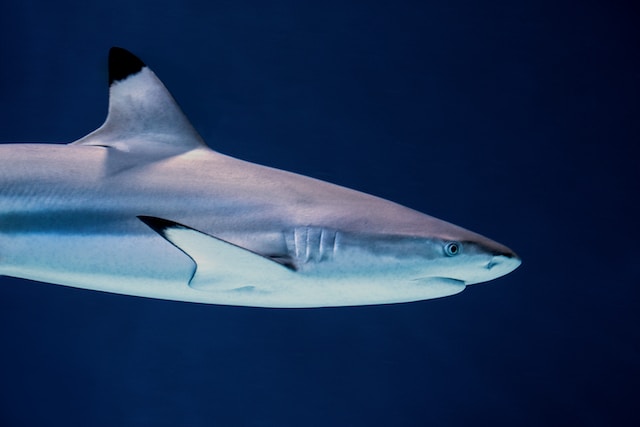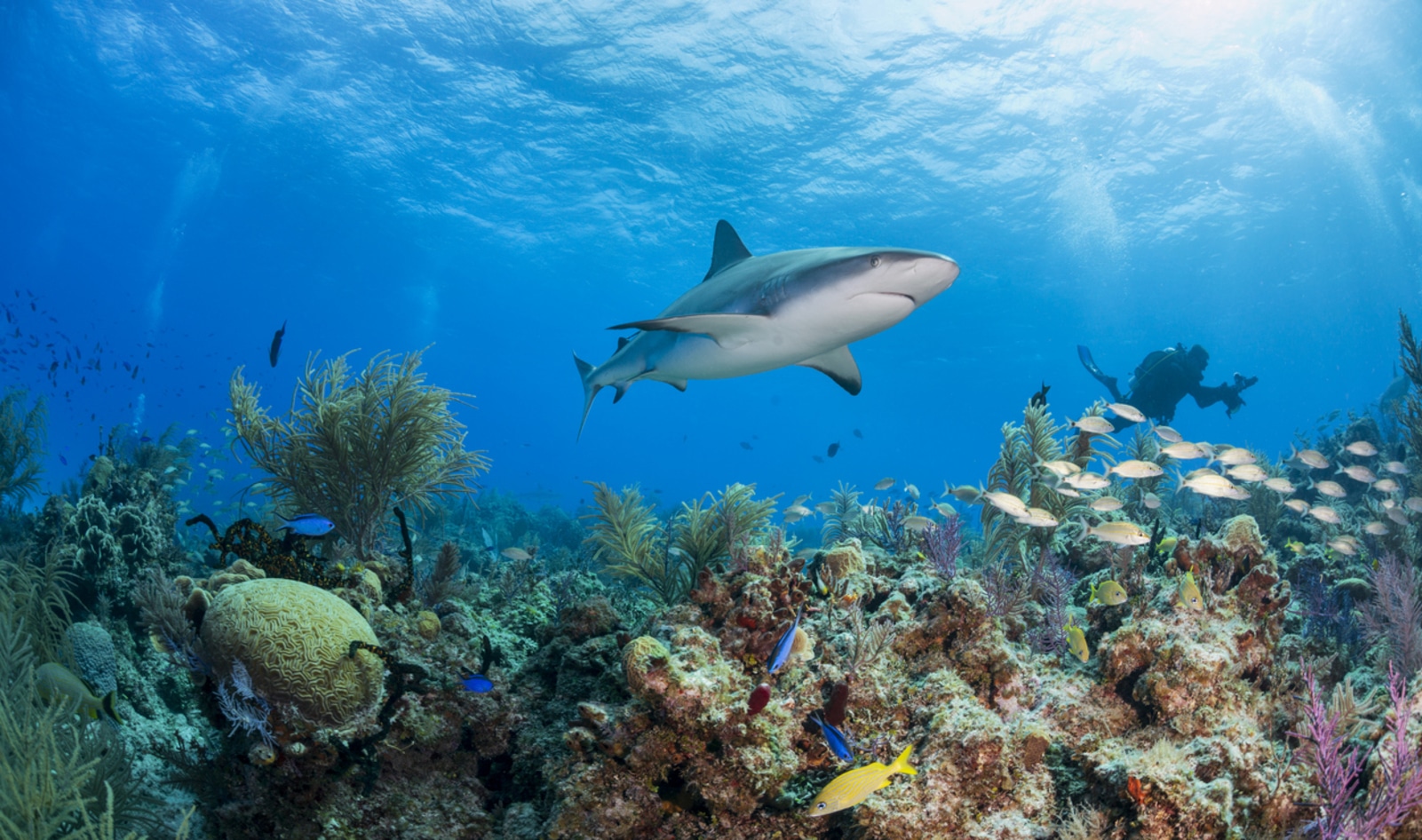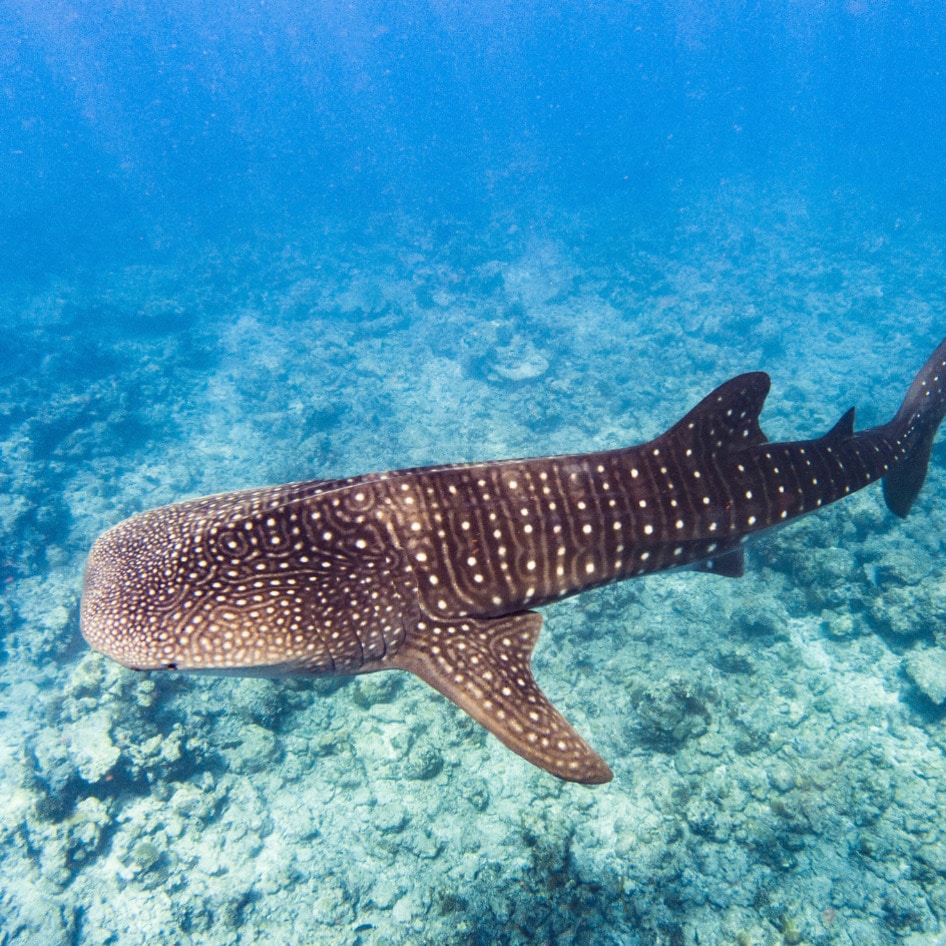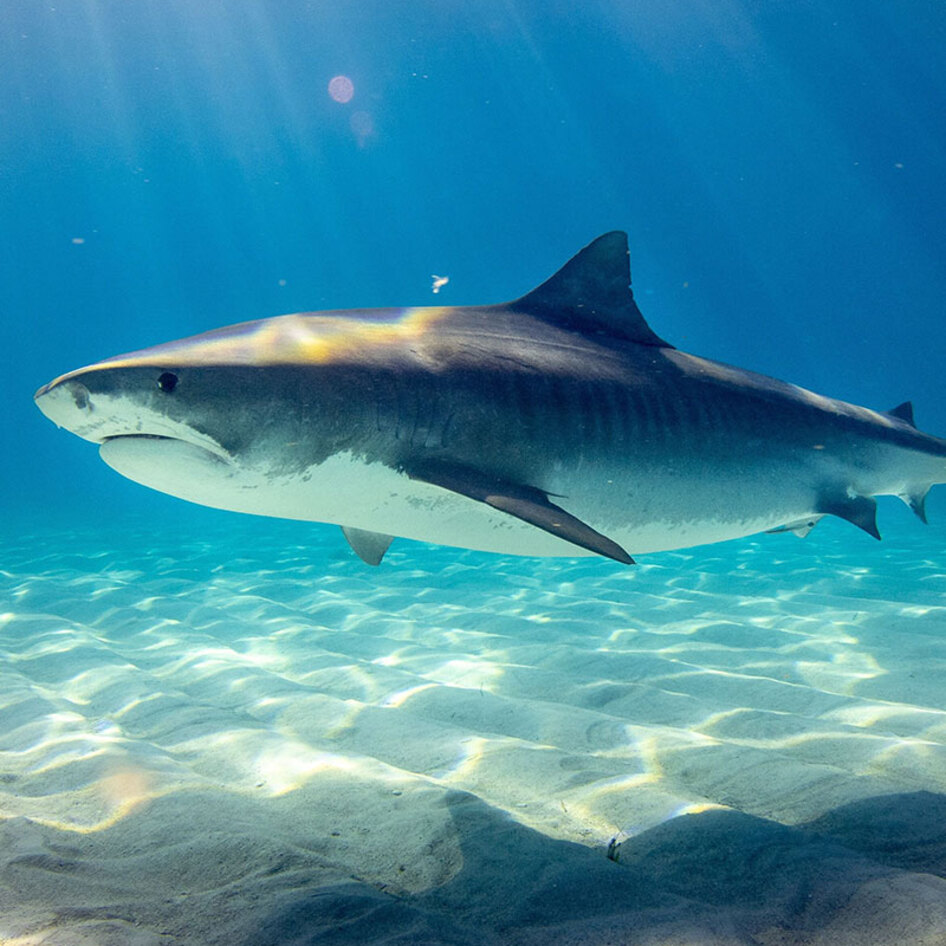Sharks have a bad reputation, let’s be honest. Over the years, they’ve been the target of horror movies and media sensationalism, which has earned them the arguably pretty unfair title of “dangerous human eaters.” But actually, research suggests it is not humans who should be afraid of sharks, but sharks who should be afraid of us.
Over the last few decades, human activity has put the ocean and its ecosystems under immense pressure through a combination of overfishing, plastic pollution, and rising emissions. And now, the marine world is starting to buckle.
Numbers of reef sharks—known for their pointy dorsal fins, love of small fish, and vital apex predator role—are dropping dramatically. And they’re not alone—marine species and habitats everywhere are under threat. But there are things that can be done, including tighter regulation and more marine protected areas. But also, one of the biggest things that we can do as consumers? Leave fish (and all animals) off the plate. Here’s why.
The plight of coral reefs and their sharks
Right now, most shark populations are at risk. In fact, the International Union for Conservation of Nature (IUCN), notes that around 470 species of shark are endangered to some degree. This is a big problem, not just for the sharks themselves, but also for their ecosystems. Sharks are apex predators, which means they help to keep marine populations healthy and in check.
And, according to a new study published in Science, reef sharks, in particular, which populate the world’s coral reefs, are suffering. Researchers noted that the numbers of the main five shark species found on coral reefs—blacktip reefs, grey reefs, whitetip reefs, nurse sharks, and Caribbean reefs—have dropped by 63 percent. And overfishing is to blame.
 Unsplash
Unsplash
Every year, around 100 million sharks are pulled from the ocean and killed. Many end up as shark fin soup, which is a traditional Chinese delicacy thought to have several benefits. But shark fin fishing is far from exclusive to Asia—half the trade comes from European countries, like Italy, France, Spain, and Portugal.
But fishers can’t just take sharks from any region. Some areas of the ocean are Marine Protected Areas (MPA), and in these places, conservation is king and, as a result, the reef shark populations are still thriving.
“While overfishing and poor governance is associated with the absence of these species, they are still common in MPAs and places where shark fishing was banned or highly regulated,” Demian Chapman, lead scientist of Global FinPrint and director of the Sharks and Rays Conservation Program at Mote Marine Laboratory, said to Forbes.
“This study can be used to help identify those nations where such catches would be detrimental,” he said. “We need to act now to stop the widespread extinction of shark species in many parts of the world.”
But overfishing is just one way the fishing industry impacts coral reefs and their wildlife residents. Another new study, published in July 2023 in the journal Nature, suggests that most of the plastic pollution in these areas comes from fishing activity. And this pollution is not just at the surface of the water but actually increases with depth. This suggests reef species are struggling to get away from human impact, no matter how far down the ocean they go.
“Plastic pollution is one of the most pressing problems plaguing ocean ecosystems, and coral reefs are no exception,” Hudson Pinheiro, PhD, the study’s lead author, said in a statement. “From macroplastics that spread coral diseases to fishing lines that entangle and damage the structural complexity of the reef, decreasing both fish abundance and diversity, pollution negatively impacts the entire coral reef ecosystem.”
How can a vegan diet help the ocean?
Protecting and reviving ocean health is far more complex than one single solution. Researchers are calling for deeper MPAs, for example, and tighter international agreements on plastic pollution from the fishing industry.
Some are also calling for biodegradable fishing equipment—this would benefit the coastal communities that rely on fishing for their livelihoods. “If we act fast and employ science-based solutions, there absolutely is hope for coral reefs,” coral reef study author Paris Stefanoudis said.
But for the millions of consumers who don’t rely on fishing for survival or for their income, there is another solution to help relieve the pressure on underwater ecosystems: leave fish off the plate and opt for vegan alternatives instead.
 The Plant Lab
The Plant Lab
Right now, the global vegan fish market is valued at around $183 million, according to Fact.MR, but by 2033, it could soar to $2.19 billion. For more on the different types of vegan fish out there right now, you can follow our guides to vegan sushi and vegan seafood sandwiches.
But, when it comes to protecting the ocean, consumers may have to do more than cut fish from their diets.
Research suggests that as temperatures soar around the globe on land, this is also having an impact on the oceans. In fact, right now, sea temperatures are at record levels, and this is also putting underwater ecosystems at risk.
One key contributor to these rising temperatures is animal agriculture, which emits around 14.5 percent of global greenhouse gasses. In particular, the meat industry is a big emitter of methane, a greenhouse gas 25 times as potent as carbon dioxide. Because of the environmental issues associated with animal agriculture, scientists around the world have called for a drop in meat consumption. In April 2022, for example, researchers from the University of Bonn in Germany urged rich countries to cut their meat consumption by 75 percent.
“If all humans consumed as much meat as Europeans or North Americans, we would certainly miss the international climate targets and many ecosystems would collapse,” lead researcher Matin Qaim said.
For more on how to go vegan, read:
JUMP TO ... Latest News | Recipes | Guides | Health | Subscribe









